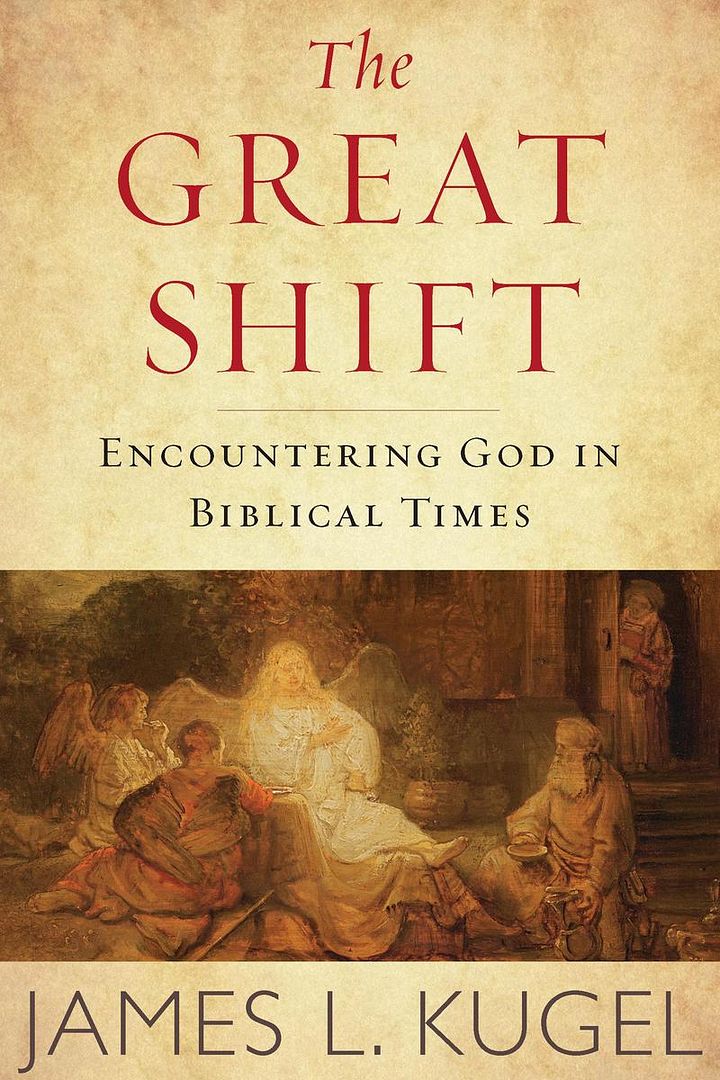 It's impossible to guess how interesting or helpful someone not well-acquainted with the bible would find The Great Shift. It's also impossible briefly to describe the basic content of James Kugel's most recent book: is it about the gradual development of the concept of the individual (I, id, person, ego, self, soul), or does it describe humanity's slow recognition of the nature and essence of the God of the bible? Yes.
It's impossible to guess how interesting or helpful someone not well-acquainted with the bible would find The Great Shift. It's also impossible briefly to describe the basic content of James Kugel's most recent book: is it about the gradual development of the concept of the individual (I, id, person, ego, self, soul), or does it describe humanity's slow recognition of the nature and essence of the God of the bible? Yes.When a person studies scripture seriously, they learn something about sources, a fair amount about historical, cultural, political, and economic context. After some time and a lot of study, they can make educated and often accurate conjectures about where a passage might have originated, to what degree and how – sometimes even where – it could have been edited. For people of church or synagogue, making the witness of scripture a vital part of everyday family, community, and civic life is the ultimate goal.
Like the author, I claim membership in a faith community that affirms the authority of scripture as a testimony of the life together of God with the people of God and as a guide for daily life. If I'm teaching or presenting to a group that doesn't already know me, in order to defer some questions and concerns I usually explain, "I have a very high view of scripture as the word of God; I have an equally high view of scripture as a human word, with all the ambiguity that implies."
Kugel reveals new aspects of some passages many of us thought we knew. He enhances many of his observations regarding the texts of [mostly] the Hebrew bible with parallel and similar instances in extra-biblical and non-canonical literature from the same periods. It's interesting how Hebrews (later known as Israelites and then Jews) imagined and then created a religion with gods that reflected characteristics, preferences, and habits of divinities belonging to their neighbors; we're learning more and more about the strong human tendency toward mimesis or imitation, so not surprisingly, that's what they did. Or... was the original modality of Abraham, Isaac, Jacob and all the rest a real religion as we define religion? Or not? A thread that weaves through The Great Shift reminds us how early on, in many instances the god or the god's emissaries appeared or spoke in a form similar to a human person's, though communication and from the great outside, from heaven, or from elsewhere than here hardly astonished those early hearers and observers. You remember God's charge to Abram in Genesis 12? Abraham's visitors in Genesis 18? Jacob/Israel's wrestling into an out of joint hip and a new identity in Genesis 32? Those types of encounters seem to have stopped happening; the "why" belongs to some of the book's trajectory.
With a centuries-long history that ultimately becoming codified in the words of a book that at first was a neuter plural, later feminine singular, among all the deities of the ancient near east, the God Whose people would be His prized possession if they obeyed uniquely was a god of commandments (ordinances, laws, ways, statues, precepts, testimonies) spoken and given – and written down – as grace-filled gift not solely for the glory of God, but also for the well-being of all creation. A long time arriving at an understanding of a Divinity who does not require extravagant tribute, whose first concern is the integrity of the creation He even chooses to inhabit!
This is a thick, heavy book; chapters average about twenty pages each. Kugel writes extremely well, without any of those annoying habits we all know about and wish people would forget about using. Although he's also a person of religious conviction, Professor Kugel presents the material like the scholar and the teacher he is. Because of my familiarity with the biblical texts and my theological background, I found none of it tough or rough-going, but again I'd caution whether or not you're religious or even somewhat spiritual, The Great Shift may or may not be for you. It has shifted my broad perspective on the story of the God and the people of the bible and sparked my interest in reading a little more anthropology. In the end, James Kugel agrees with a quote from the late Flannery O'Connor "I do not know You, God because I am in the way. Please help me push myself aside." That's where I find myself.
My Amazon Review: Revelatory!

No comments:
Post a Comment
thanks for visiting—peace and hope to all of us!